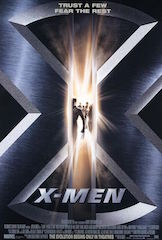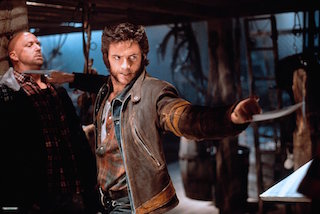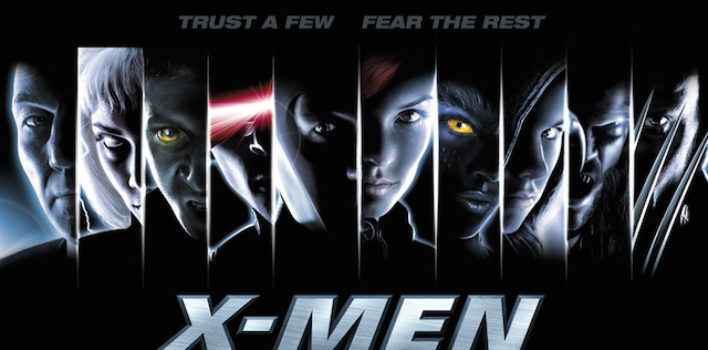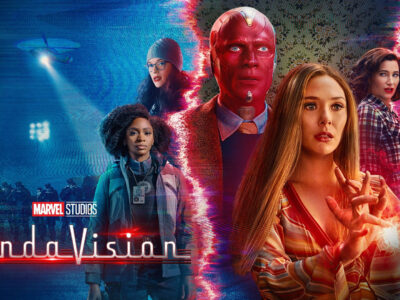Review| X-Men
 How does one make a film with characters called Storm, Sabertooth, Cyclops, and Magneto and make it believable? Well, with a great sense of humor about itself and some poignant and relevant themes.
How does one make a film with characters called Storm, Sabertooth, Cyclops, and Magneto and make it believable? Well, with a great sense of humor about itself and some poignant and relevant themes.
Starting very purposefully with a WWII-era scene that evokes the horrors of the Holocaust, the film proceeds to show us the enduring legacy of elitism and violence and wonders at what kind of response it warrants.
It is because of that first scene that we’re able to sympathize with Eric Lehnsherr (Magneto), understanding what has led him to so fiercely take sides in the human vs. mutant debate around which the film is based that he ends up trying to start a war to protect his kind.
The beliefs that built Nazi ideology are present in the film’s central conflict. Non-mutants believe they must protect themselves from mutants, whom they deem as the “freak” to their normalcy. Magneto believes that mutants are superior beings and deserve a place of power and respect, even to the detriment of those not like them, or those who won’t join their cause. If he recognizes in his position the same elitism that led to the persecution of him and his family so long ago, he does not show it.
There are always two immovable forces opposing each other in this film, but their “faces” are interchangeable: Nazi vs. Jew, Human vs. Mutant, Professor X vs. Magneto. The “us vs. them” argument in the film is expressed so many times, from so many different angles, that it could seem obvious and tedious; but it is actually this very repetition that causes the story to work so well. It drives home the reality that we may not be so different from those we war against. We can all manufacture justifiable arguments for our own position. As long as we protect it and ourselves by returning violence for violence and fear for fear, the cycle continues, and who is good and who is bad runs together until one is indistinguishable from the other.
Although Charles Xavier (Professor X) and his mutant cohorts would seem on the surface to propose a “third way,” we eventually see that Magneto is correct in projecting that their methods of dealing with the situation are naive and temporary. Indeed, they do take sides and have to use violence to enforce their position.
Magneto: “Doesn’t it ever wake you in the night, the feeling that someday they will pass that foolish law, or one just like it, and come for you? And your children?”
Professor X: “It does indeed.”
Magneto: “What do you do when you wake up to that?”
Professor X: “I feel a swell of pity for the poor soul who comes to that school looking for trouble.”
Most characters in this film have chosen a side in the non-mutant vs. mutant debate. Enter our central character–Wolverine. He represents the middle ground, with all its complications. To not choose a side is to have chosen one. To not fight for good is to be on the side of evil.
 In the end, it is he alone who shows us that there actually is another way: self-sacrifice. When he and Professor X’s mutants discover that Magneto is using up the life of an innocent mutant girl (Rogue) to enact his plan to save mutants, Wolverine calls out this contradiction and hypocrisy in his frank, crass way that we love so much.
In the end, it is he alone who shows us that there actually is another way: self-sacrifice. When he and Professor X’s mutants discover that Magneto is using up the life of an innocent mutant girl (Rogue) to enact his plan to save mutants, Wolverine calls out this contradiction and hypocrisy in his frank, crass way that we love so much.
Magneto: “Why do none of you understand what I’m trying to do? Those people down there control our fate and the fate of every other mutant! Well…soon our fate will be theirs.”
Wolverine: “You’re so full of shit. If you’re really so righteous, it’d be you in that thing.”
Wolverine “puts his money where his mouth is” when he ends up sacrificing his life for Rogue’s. To save her, he allows her to take on his wholeness while he bears the stripes, wounds, and scars that it took to save her. Sound familiar, Christian reader? There’s your Jesus-metaphor, plain as day.
There is a “third way” to take in the conflicts that pit us against one another in the interest of self-protection. It is not for the faint of heart. It requires self-sacrifice, even to death. When violence and retribution feed back into the destructive loop, self-sacrifice and forgiveness slam the breaks on the cycle. Its results may not be as immediate as we want, and may require more than we’re willing to give, but its legacy is so enduring that even death cannot snuff it out.







